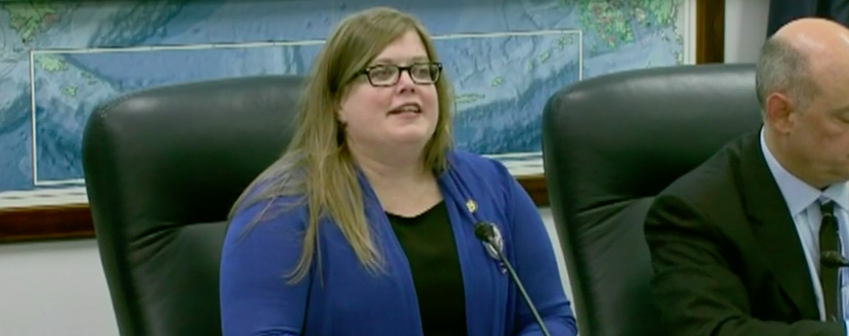
FIREWORKS AS GERAN TARR SCOLDS WITNESS
An Alaska’s State House Resources Committee co-chair, already on the record against oil development, interrupted the testimony of Alaska’s spokesperson for the oil and gas industry during a Wednesday night hearing.
Rep. Geran Tarr cut off Kara Moriarty abruptly and then gave her a public scolding.
Moriarty, the CEO of the Alaska Oil and Gas Association, was the first person to testify during the hearing that started at 6:30 pm, and the rebuke from Tarr came within the first few minutes.
Tarr, D-Anchorage, lectured Moriarty about what would and would not be allowed in her testimony: “Ms. Moriarty, we are not going to make statements like that in this committee,” Tarr warned. “So you’re not going to impugn the motives of that individual. If you want to respond to anything that was said, that’s fine. But we’re not going to do that.”
GARBAGE IN, GARBAGE OUT
What drew Tarr’s ire is that Moriarty had firmly challenged old data presented by an invited speaker brought in by Tarr and co-chair Andy Josephson, D-Anchorage, to shore up their argument for higher taxes.
The expert had provided bad information to the committee two days earlier, and Moriarty was calling him out on it.
Moriarty, between that Monday hearing and her opportunity to testify on Wednesday, had discovered that his company not only had access to new data, but the new information had already been provided to the State Competitiveness Review Board. He had denied the information was available.

Rich Ruggiero of Castle Gap Energy Partners had simply chosen not to use the new data, but relied on an old slide from 2011, when oil was over $90 a barrel and tax policies were quite different across the globe.
And when asked on Monday by committee member Rep. Dave Talerico, R-Healy, for updated information, Ruggiero shrugged off the question by saying it would be pretty hard to get. That was not true.
Ruggiero, who helped the Palin administration craft the disastrous but now-defunct ACES tax plan, was paid $35,000 by House Democrats to give testimony favorable to raising oil taxes. He testified that Alaska raising its oil taxes often is not unusual, because it’s done all over the world all the time.
He also told the committee that they should expect to hear pushback from industry trade organizations like the Alaska Oil and Gas Association, which he said would bring out the same old “detracting themes” that industry brings up all over the world — how stability, competition and jobs will be negatively impacted if Alaska enacts higher taxes on industry.

When Moriarty had her turn to speak on Wednesday, she came roaring out of the gate, blasting the old data and Ruggiero’s implication that the oil industry would try to mislead the committee.
“Your consultant on Monday mentioned that Alaska is not the only government changing taxes. And he used the six-year-old slide to demonstrate that point. He was very direct and told you that industry, including the trade association — in fact, he called out AOGA directly — would deploy ‘detracting themes’ such as stability, competition, and jobs, as reasons why you should not increase government take,” Moriarty said.
“I just want to put it on the record that I personally take great exception to his choice of words, and frankly I find them insulting,” Moriarty said.
“He was insinuating that industry is not credible and that these themes should not be believed. The reason the industry does talk about stability, competition, and jobs across the globe is that they are real factors,” Moriarty continued.
Moriarty explained she had easily found Ruggiero’s company updates through 2016. She found them on the State’s own website. She continued: By using old data, it appeared that Ruggiero was either ill-prepared or was trying to push an agenda.
That’s when Tarr snapped at Moriarty, and then abruptly cut off committee member Chris Birch, R-Anchorage: “You will not interrupt the chair!”
Moriarty didn’t back down; she was responding to the charts provided by Ruggiero, which were obviously inaccurate.
TERM OF THE DAY: ‘DETRACTING THEMES’
Curiously, during Ruggiero’s Monday testimony, he had also assigned motives to the oil industry, with his prediction of “detracting themes” the committee should expect. But his impugning of the motives of the oil and gas association was allowed and then actually defended by the committee co-chairs. When Moriarty made the very accurate and important observation that Ruggiero’s slides were either intentionally or unintentionally erroneous, Tarr leaped to his defense by inventing a new standard for testimony on the spur of the moment. That new standard seems to be that testifiers are welcome to impugn the credibility of industry, but industry is not allowed to defend itself.
The co-chairs also showed favoritism to another testifier who was clearly in their corner on raising oil taxes. Earlier this session, the co-chairs allowed oil industry foe Robin Brena, a political ally of Gov. Bill Walker, a full two hours to testify about the need for sharply higher oil taxes, during which time he showed over 50 slides and several times impugned the motives of Alaska’s oil producers.
Tarr and Josephson, both considered stridently anti-resource development, were recorded at a December 13 meeting of the Alaska Center (for the Environment), where Josephson told the members present, “Use my office and Rep. Tarr’s office as a virtual satellite office.” The Alaska Center for the Environment’s mission statement includes its political agenda: “We engage, empower and elect Alaskans to stand up for our clean air and water, healthy communities, and a strong democracy.” The group spends significant funds to elect anti-development Democrats.
As hearings continue, Tarr is making it clear the House Resources Committee is the Alaska Center’s satellite operation, and that the oil industry now must answer to her and can keep their “detractor themes” to themselves.